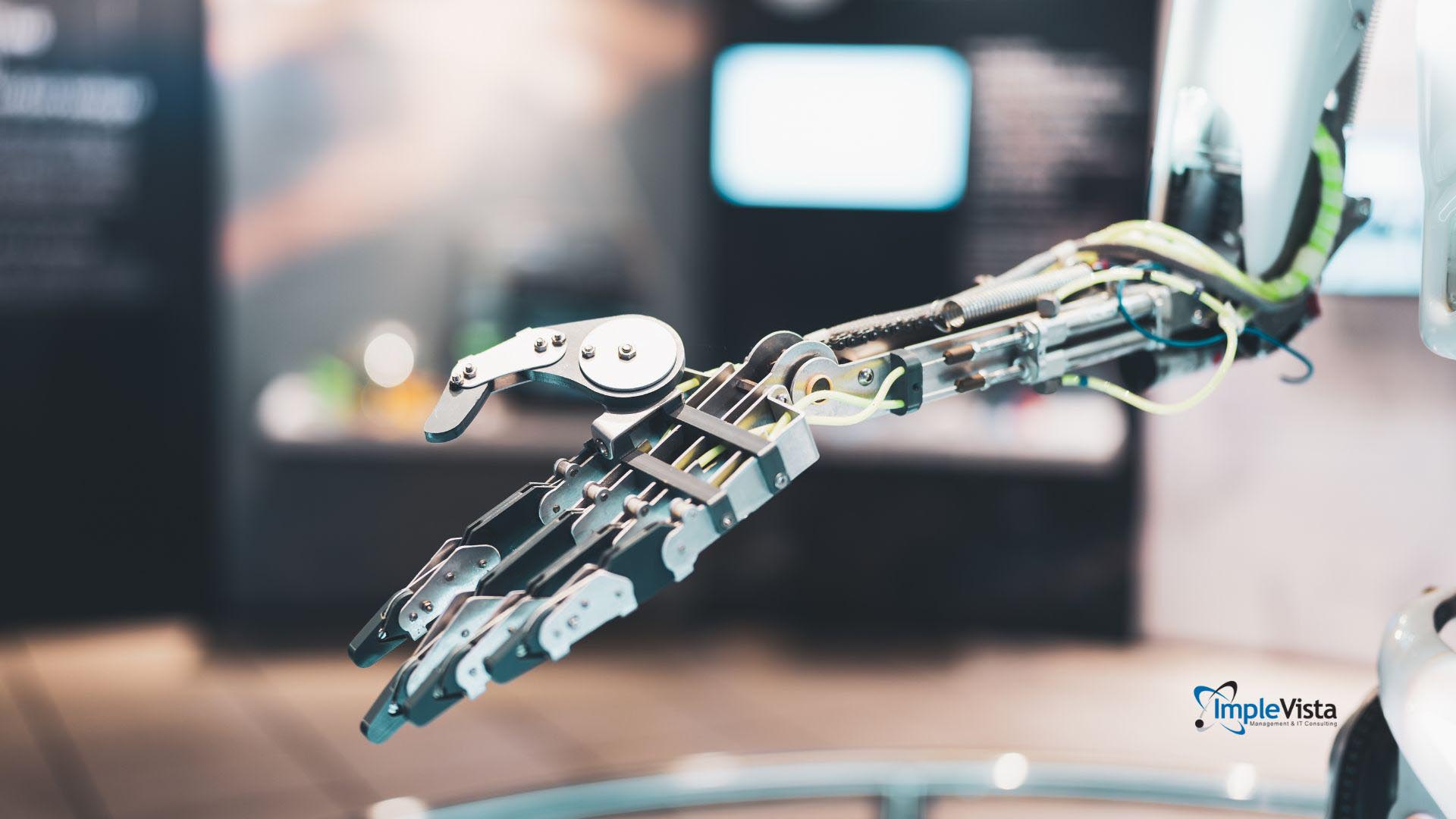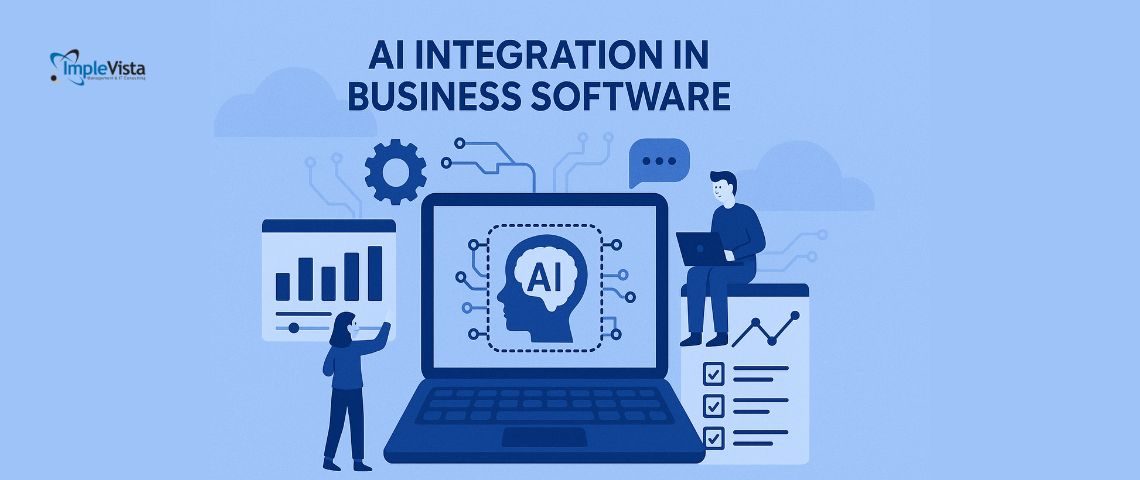AI integrations for business are no longer optional—they’re the secret to more brilliant, faster, and scalable operations.
As technology continues to evolve rapidly, more and more businesses are embracing artificial intelligence (AI) to streamline their operations and stay competitive. AI integrations for business software are no longer futuristic; they’re a wise, strategic investment. From simplifying routine tasks to unlocking powerful data insights, AI reshapes how companies function and make decisions in a competitive market.
What are AI Integrations for Business Software?
| Aspect | Before AI Integration | With AI Integration |
| Customer Interaction | Manual answering of customer questions. | AI-powered chatbots handle common questions instantly. |
| Task Execution | Repetitive tasks are performed manually. | Automated tasks, freeing up human workers. |
| Data Analysis | Human-driven, limited processing of large data volumes. | AI processes and makes sense of massive data faster and more accurately. |
| Insights & Decisions | Based on human analysis, potentially limited insights. | AI provides deeper, data-driven insights for smarter decisions. |
| Personalization | Limited ability to personalize customer experiences. | AI enables highly personalized experiences and recommendations. |
| Technology Accessibility | AI is often a separate, complex technology for specialists. | AI capabilities are built-in features, easier to use within existing software. |
First, let’s clarify what AI integration in business software means. It’s about adding AI capabilities directly into the software tools businesses use daily. Instead of being a separate, complex technology that only specialists can use, AI becomes a built-in feature that makes existing software more intelligent and capable.
Think of it this way:
- Before AI: Your customer service team uses software to answer customer questions manually.
- With AI Integration: Your customer service software now has an AI-powered chatbot that can answer common questions instantly, freeing up your team for more complex issues.
This integration is possible because AI technologies, such as Machine Learning (ML), Natural Language Processing (NLP), and computer vision, are becoming more mature and easier to use. These technologies can be embedded into everything from customer relationship management (CRM) systems and enterprise resource planning (ERP) software to marketing automation platforms and cybersecurity tools. The goal of AI integrations for business is to automate tasks, provide deeper insights, personalize experiences, and make smarter decisions.

Why Are Businesses Looking at AI Integrations for Business Now?
The push for AI integrations for business isn’t just about following a trend. Precise business needs and opportunities drive it:
- Massive Data Volumes: Businesses collect vast amounts of data daily. AI can process and make sense of this data faster and more accurately than humans.
- Need for Efficiency: Companies are always trying to do more with less. AI automates repetitive tasks, freeing up human workers.
- Customer Expectations: Customers expect fast, personalized, and seamless interactions. AI can help deliver this.
- Competitive Pressure: Businesses that adopt AI gain an edge in speed, insights, and service delivery.
- Accessibility of AI Tools: AI development platforms and pre-built AI services (like those from Google, Microsoft, and Amazon) are now more accessible and affordable.
For businesses in Dhaka, Bangladesh, embracing AI integration in business software can be a powerful way to stay competitive in a rapidly developing economy, attract new talent, and better serve a growing customer base.

How AI Integrations for Business Drive Value
| Business Area | How AI Integration Helps (Beyond Hype) | Key Benefits |
| Customer Service | Automates routine queries analyzes sentiment, and personalizes support. | Faster service, happier customers, freed staff. |
| Sales & Marketing | Predicts sales, personalizes campaigns and automates lead nurturing. | Higher conversions, better ad spend, targeted outreach. |
| Operational Efficiency | Automates complex tasks, optimizes supply chains, and reduces manual data entry. | Lower costs, smoother processes, and fewer errors. |
| Financial Management | Automates reconciliation detects fraud, and improves forecasting. | Better financial control, reduced risk, and intelligent planning. |
| Human Resources | Automates hiring analyzes engagement, suggests learning, and predicts exits. | Faster hiring, better retention, happier staff. |
| Cybersecurity | Detects threats in real-time automates responses and identifies vulnerabilities. | Stronger defenses, less damage, and proactive safety. |
Let’s move beyond the general ideas and look at specific, tangible ways AI integration in business software makes a difference today.
-
Transforming Customer Service with Smart Automation
This is one of the most visible areas where AI integrations for business shine.
- AI-Powered Chatbots: These bots can handle many routine customer inquiries 24/7, from answering FAQs to guiding users through processes. This reduces waiting times and allows human agents to focus on complex, high-value issues.
- Sentiment Analysis: AI can analyze customer conversations (emails, chat, social media) to understand their mood and urgency. This helps prioritize support tickets and allows agents to respond with empathy.
- Personalized Support: AI can pull up relevant customer history and product information for agents, helping them provide tailored solutions more quickly.
- Automated Ticket Routing: AI can analyze incoming customer requests and automatically send them to the most appropriate department or agent, speeding up resolution.
Imagine a travel agency in Dhaka using an AI-powered chatbot to answer questions about flight schedules, freeing up staff to handle more intricate booking changes or customer issues. This is a direct benefit of AI integration in business software.
-
Revolutionizing Sales and Marketing Efforts
AI integrations for business empower sales and marketing teams to be far more effective and personalized.
- Predictive Sales: AI can analyze past customer data to predict which leads will most likely convert, helping sales teams prioritize their efforts. It can also suggest the following best actions for sales reps.
- Personalized Marketing Campaigns: AI segments customers based on behavior, preferences, and demographics, allowing for highly targeted email campaigns, product recommendations, and ad placements.
- Automated Content Creation: AI can assist in generating marketing copy, social media posts, and even basic reports, saving time for content teams.
- Lead Scoring and Nurturing: AI automatically scores leads based on their engagement, ensuring that valuable leads are identified and nurtured effectively through automated workflows.
This means less guesswork and more data-driven strategies, leading to higher conversion rates and a better return on investment for your marketing spend. This is a powerful part of the future of AI in business.
-
Enhancing Operational Efficiency and Process Automation
Many internal business processes are repetitive and rules-based, making them perfect candidates for AI integration in business software.
- Intelligent Automation (RPA + AI): Combining Robotic Process Automation (RPA) with AI allows for automation of more complex, unstructured tasks. AI can read and process invoices, extract data, and even handle exceptions that traditional RPA might miss.
- Supply Chain Optimization: AI can predict demand fluctuations, optimize inventory levels, and identify potential disruptions in the supply chain, leading to cost savings and improved delivery times.
- Resource Allocation: AI can analyze project data and employee skills to recommend optimal team assignments, improving project success rates.
- Data Entry Automation: AI-powered tools can extract data from documents (like contracts or forms) and automatically enter it into relevant systems, drastically reducing manual data entry.
Streamlining these operations can significantly reduce overhead costs and improve overall productivity.

-
Driving Smarter Financial Management and Fraud Detection
Finance departments benefit from AI integrations for business in various ways, particularly in risk management and forecasting.
- Automated Reconciliation: AI can quickly match transactions across multiple accounts and systems, flagging discrepancies for human review.
- Fraud Detection: AI algorithms can analyze transaction patterns to identify anomalies that suggest fraudulent activity, helping businesses protect their assets.
- Financial Forecasting: AI can analyze historical financial data and external factors to generate more accurate revenue and expense forecasts, aiding in better budgeting and strategic planning.
- Credit Risk Assessment: AI can assess creditworthiness by analyzing vast data points, leading to more accurate and faster lending decisions.
These capabilities provide greater financial control and peace of mind, showcasing another key area for the future of AI in business.
-
Improving Human Resources and Talent Management
AI is also changing how companies manage their most valuable asset: people.
- Automated Resume Screening: AI can quickly scan resumes and identify candidates whose skills and experience best match job requirements, speeding up the hiring process.
- Employee Engagement Analysis: AI can analyze internal communications and survey data to gauge employee sentiment and identify areas for improving morale and productivity.
- Personalized Learning Paths: AI can recommend training courses and development opportunities tailored to individual employee needs and career goals.
- Attrition Prediction: AI can analyze various factors to predict which employees are at risk of leaving, allowing HR to intervene proactively.
Businesses can attract, retain, and develop top talent by making HR processes more efficient and data-driven.
-
Enhancing Cybersecurity Defenses
In an age of increasing cyber threats, AI integrations for business are becoming critical for defense.
- Threat Detection: AI can analyze network traffic and system logs in real time to identify unusual patterns and potential cyber threats that might go unnoticed by human analysts.
- Automated Incident Response: AI can trigger computerized responses to detected threats, such as isolating infected systems or blocking malicious IP addresses, minimizing damage.
- Vulnerability Management: AI can help identify weaknesses in software and systems before attackers can exploit them.
- Predictive Security: By learning from past attacks, AI can predict future attack vectors and proactively strengthen defenses.
This proactive approach to security is a significant advantage for businesses aiming to protect their valuable data and systems.

The Future of AI in Business: What’s Next?
The journey of AI integration in business software is still in its early stages. Still, the future of AI in business holds even more exciting possibilities.
- Hyper-Personalization: AI will enable even deeper levels of personalization across all customer touchpoints, from product development to post-purchase support.
- Proactive Operations: AI will move beyond reacting to data to proactively predicting problems and suggesting solutions before they arise (e.g., predicting equipment failure and customer churn).
- Generative AI in Workflows: Beyond basic text generation, AI will create complex reports, design interfaces, and develop code snippets within business applications, truly augmenting human capabilities.
- AI-Powered Decision Support Systems: AI will become an indispensable partner in strategic decision-making, providing insights and recommendations based on vast data.
- Ethical AI and Trust: As AI becomes more prevalent, the focus will shift to developing ethical AI frameworks that ensure fairness, transparency, and accountability in AI systems.
- Edge AI and IoT Integration: AI models will increasingly run on devices at the “edge” of networks (e.g., smart sensors, factory equipment), enabling real-time insights without sending data to the cloud.
For businesses in Dhaka, keeping an eye on the future of AI in business means staying competitive and identifying new growth avenues.
Overcoming Challenges in AI Integrations for Business
While the benefits are clear, successfully implementing AI integrations for business has hurdles.
- Data Quality and Availability: AI thrives on good data. Businesses must ensure their data is clean, accurate, and accessible for AI models to learn effectively.
- Skill Gap: There’s a shortage of AI talent. Businesses must either invest in training existing staff or partner with expert IT service providers like Implevista.
- Integration Complexity: Integrating AI with legacy systems can be complex, requiring careful planning and execution.
- Ethical Concerns: Issues around data privacy, bias in AI algorithms, and job displacement need to be addressed thoughtfully.
- Cost of Implementation: While long-term ROI is high, the initial investment in AI tools and expertise can be substantial.
- Resistance to Change: Employees may be wary of AI. Proper change management, clear communication, and training are vital for adoption.
Partnering with an experienced IT service company like Implevista can help navigate these challenges, ensuring a smooth and effective implementation of AI integration in business software.
Real-World Case Studies
IBM and Scuderia Ferrari
IBM partnered with Scuderia Ferrari to revolutionize fan engagement through an AI-powered mobile app, leveraging IBM’s Watson platform. This collaboration addresses Ferrari’s need for a digital platform that enhances user interaction and global scalability. The app processes real-time data and delivers personalized experiences, bringing fans closer to the action on and off the track. This AI integration in business software strengthened Ferrari’s global fan base and positioned the company as a forward-thinking brand in sports and entertainment.
(Source: IBM Newsroom)
Coca-Cola and AI-Powered Personalization
Coca-Cola uses AI algorithms to analyze customer data from vending machines and mobile apps. These insights allow the company to deliver targeted promotions and personalize the customer experience. As a result, Coca-Cola has improved its customer retention and increased digital engagement.
Implevista: Your Partner for AI Integrations in Business Software in Bangladesh
As a leading IT service company in Dhaka, Bangladesh, Implevista is uniquely positioned to help your organization harness the power of AI. We don’t just talk about the hype; we deliver tangible solutions. Our AI specialists and software engineers work closely with businesses to understand their unique needs and design custom AI integrations for companies that drive real results.
Our services include:
- AI Strategy & Consulting: Helping you identify the best opportunities for AI integration in business software that align with your business goals.
- Custom AI Development: Building bespoke AI models and applications tailored to your requirements.
- AI Integration Services: Seamlessly embedding AI capabilities into your existing CRM, ERP, HR, marketing, or other business software.
- Data Preparation & Management: Ensuring your data is clean, organized, and ready for AI model training.
- AI Solution Deployment & Management: Assisting with deploying, monitoring, and optimizing your AI-powered systems.
- Training & Support: Empowering your team to use and benefit from AI integrations effectively.
We are committed to helping Bangladeshi businesses unlock AI’s transformative potential, turning complex technology into practical, value-driven solutions. Let us show you how the future of AI in business can start today, right here in your organization.
Frequently Asked Questions (FAQs): AI Integrations for Business Software
- What does “AI integration in business software” really mean?
AI integration in business software means directly adding Artificial Intelligence features into the software programs businesses use daily, like CRM, ERP, or marketing tools. This makes the software more intelligent and capable, allowing it to automate tasks, provide insights, and personalize experiences.
- Why should my business consider AI integrations for business now?
Businesses should consider AI integrations for business now to handle vast amounts of data better, increase efficiency by automating tasks, meet higher customer expectations for personalization, gain a competitive edge, and take advantage of increasingly accessible AI tools.
- What are some real-world examples of AI integrations for business?
Examples include AI-powered chatbots for customer service, predictive analytics in sales to identify likely buyers, intelligent automation (RPA + AI) for processing documents like invoices, fraud detection in finance, and AI-assisted resume screening in HR.
- How does AI integration help improve customer service?
AI integration in business software helps by powering chatbots for instant answers, analyzing customer sentiment to prioritize issues, providing agents personalized customer history, and automatically routing support tickets to the right teams, leading to faster and better service.
- What is the impact of AI integrations on sales and marketing?
In sales and marketing, AI integrations for business enable predictive lead scoring, highly personalized marketing campaigns, automated content generation assistance, and precise audience segmentation. This leads to more effective strategies and higher conversion rates.
- Is AI integration expensive for small and medium businesses in Bangladesh?
While there’s an investment, AI integrations for business are becoming more accessible and cost-effective. The long-term ROI from increased efficiency, cost savings, and improved customer satisfaction often outweighs the initial outlay, making it viable for SMEs in Bangladesh.
- Will AI integration mean I need fewer employees?
Not necessarily. The goal of AI integration in business software is often to automate repetitive, low-value tasks, freeing your employees to focus on more complex, strategic, and creative work that requires human judgment and empathy. It augments human capabilities.
- What are some challenges when implementing AI integrations for business?
Challenges include ensuring good data quality, finding skilled AI talent, dealing with the complexity of integrating AI with older systems, addressing ethical concerns (like data privacy and bias), managing initial costs, and overcoming resistance to change within the organization.
- What does the future of AI in business look like?
The future of AI in business involves hyper-personalization, proactive operational management (predicting issues before they occur), wider use of generative AI in workflows, AI-powered decision support systems, and a strong focus on ethical AI development and trust.
- How can Implevista help my business in Dhaka with AI integration?
Implevista, based in Dhaka, offers end-to-end AI services. We provide AI strategy consulting, custom AI development, seamless AI integration in business software (CRM, ERP, etc.), data preparation, deployment, and ongoing support, all tailored to the specific needs of Bangladeshi businesses.
AI integration for business is far beyond the hype—it’s a powerful tool for transformation, innovation, and growth. From enhancing productivity and customer satisfaction to unlocking new business opportunities, AI-driven software solutions are reshaping the competitive landscape.
As a leading IT service company in Dhaka, Bangladesh, Implevista is at the forefront of helping businesses unlock the full potential of AI. Our AI integration services ensure you stay ahead of the curve, efficiently and ethically.
Ready to future-proof your business with AI?
Let Implevista help you integrate AI into your business software solutions for better performance and growth.
👉 Contact us today for a free consultation, or visit our AI Solutions page to learn more




